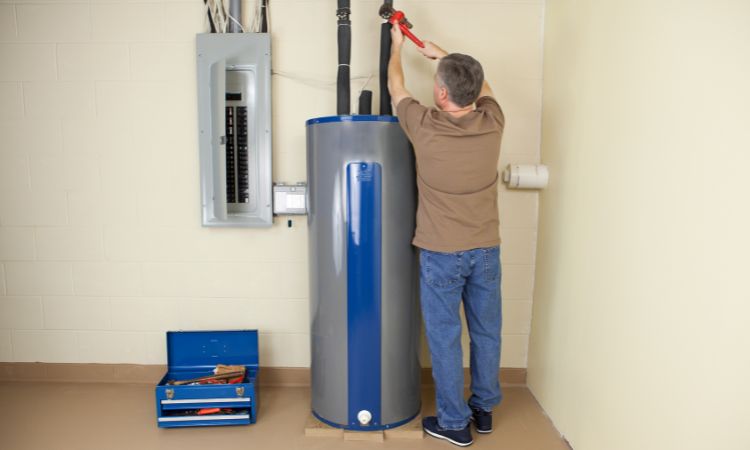The Key To Usual Water Heater Problems
The Key To Usual Water Heater Problems
Blog Article
We've noticed this post on Water Heaters Problems down the page on the internet and believe it made good sense to discuss it with you on my blog.

Imagine beginning your day without your regular warm shower. That already sets an inadequate tone for the rest of your day.
Every home requires a reputable hot water heater, however just a few recognize how to handle one. One simple means to maintain your water heater in top form is to check for faults frequently and repair them as soon as they show up.
Keep in mind to turn off your hot water heater before smelling around for mistakes. These are the water heater mistakes you are probably to run into.
Water as well warm or too chilly
Every hot water heater has a thermostat that identifies just how hot the water gets. If the water entering into your house is too warm in spite of setting a hassle-free maximum temperature, your thermostat may be damaged.
On the other hand, too cold water may be because of a stopped working thermostat, a busted circuit, or inappropriate gas circulation. As an example, if you make use of a gas hot water heater with a broken pilot light, you would certainly get cold water, even if the thermostat is in ideal problem. For electric heating units, a blown fuse may be the perpetrator.
Inadequate hot water
Hot water heater come in several dimensions, depending on your warm water needs. If you run out of warm water before every person has had a bathroom, your water heater is too tiny for your family size. You should think about setting up a bigger hot water heater container or opting for a tankless hot water heater, which occupies much less space and is a lot more long lasting.
Weird sounds
There go to the very least 5 sort of sounds you can speak with a hot water heater, however the most typical interpretation is that it's time for the water heater to retire.
To start with, you should be familiar with the regular appears a hot water heater makes. An electric heater might seem different from a gas-powered one.
Standing out or banging noises typically indicate there is a slab of debris in your storage tanks, and it's time to cleanse it out. On the other hand, whistling or hissing audios may merely be your valves allowing some pressure off.
Water leakages
Leaks can come from pipelines, water connections, shutoffs, or in the worst-case circumstance, the container itself. Over time, water will rust the container, and also find its escape. If this happens, you require to change your water heater immediately.
However, prior to your adjustment your entire container, be sure that all pipelines are in area which each valve functions perfectly. If you still require aid determining a leak, call your plumber.
Rust-colored water
Rust-colored water implies one of your hot water heater elements is rusted. It could be the anode pole, or the tank itself. Your plumber will certainly be able to recognize which it is.
Lukewarm water
Despite how high you established the thermostat, you won't get any type of hot water out of a heating unit well past its prime. A hot water heater's performance might lower with time.
You will certainly additionally obtain lukewarm water if your pipes have a cross connection. This implies that when you turn on a tap, warm water from the heating system streams in together with regular, cold water. A cross link is very easy to area. If your hot water taps still run after closing the hot water heater valves, you have a cross link.
Discoloured Water
Corrosion is a major cause of filthy or discoloured water. Corrosion within the water container or a stopping working anode rod might cause this discolouration. The anode pole protects the storage tank from rusting on the inside as well as need to be inspected annual. Without a rod or an appropriately functioning anode rod, the hot water swiftly rusts inside the container. Call a specialist water heater specialist to figure out if replacing the anode rod will take care of the issue; if not, replace your hot water heater.
Conclusion
Ideally, your hot water heater can last one decade before you need a modification. Nonetheless, after the 10-year mark, you might experience any of these faults more routinely. At this moment, you must include a new hot water heater to your spending plan.
How To Troubleshoot 3 Common Water Heater Problems in Twin Cities
The Water Heater Is Leaking
A leaky cold water inlet valve A loose pipe fitting A leaky temperature and pressure relief valve A corroded anode rod A cracked tank Turn Off Your Water Heater:
Shut off your gas water heater by turning the gas valve on the unit to the “OFF” position. Shut off your electric water by switching its power off at your electrical panel. Look for a two-pole breaker labeled “water heater” and turn it to the “OFF” position. Move the ball valve connected to the water heater to be perpendicular to the piping at a 90° angle. Look for the Leak:
Depending on whether the water is coming from the tank's top or bottom, you’ll want to look for the leak in different locations.
If the leak comes from the top of the tank, carefully look for water escaping from the cold water inlet valve or loose pipe fittings. Rusted hot and cold water valves can have loose connections with the tank, with water leaking out of them.
https://mspplumbingheatingair.com/blog/how-to-troubleshoot-3-common-water-heater-problems
As a devoted person who reads on Common Problems with Your Home Water Heater, I figured sharing that topic was worthwhile. Please take the time to promote this blog post if you enjoyed it. Thanks for taking the time to read it.
Contact for assistance. Report this page